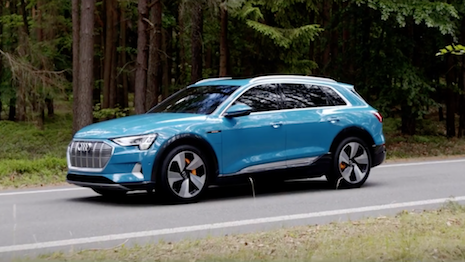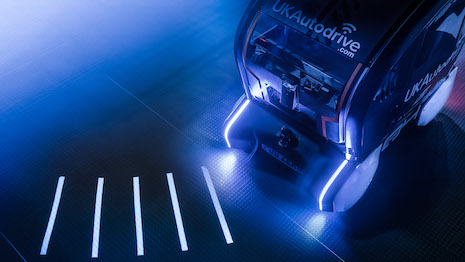 The e-tron is an all-electric SUV. Image credit: Audi
The e-tron is an all-electric SUV. Image credit: Audi
As luxury automakers continue to heavily invest in electric and self-driving vehicles, drivers remain hesitant about these categories.
According to the inaugural J.D. Power 2019 Mobility Confidence Index Study, while consumers have a low level of confidence about self-driving cars, they are more neutral about battery-electric vehicles. However, as drivers gradually become more accustomed to these offerings, there is the potential for consumer mindsets to shift.
“The purpose of the Mobility Confidence Index Study was to become the pulse of market readiness and acceptance for self-driving and battery-electric vehicles, as seen through the eyes of the consumers and industry experts,” said Kristin Kolodge, executive director of driver interaction and human machine interface at J.D. Power, Costa Mesa, CA.
“Consumers are mostly uninformed and inexperienced with both self-driving vehicles and battery-electric vehicles,” she said. “This impacts consumer purchase consideration and their understanding of potential benefits for these mobility options.”
The study was based on a survey conducted by SurveyMonkey of about 5,500 consumers about either self-driving or battery-electric vehicles.
Driver confidence
On a 100-point scale, the Mobility Confidence Index is 36 for self-driving vehicles and 55 for battery-electric vehicles.
One reason EV sentiment may have been more positive is that the majority of consumers believe there are environmental benefits to these vehicles, while there are more concerns around fully autonomous models.
Six in 10 respondents believe that EVs are better for the environment, but two-thirds have never been in such a vehicle. Only 40 percent of this uninitiated group would consider purchasing or leasing an electric vehicle.
In a promising sign for automakers, however, 75 percent of respondents who have owned or leased a battery-electric vehicle would consider repurchasing a similar model.
Other concerns about EVs are charging station infrastructure and driving range.
Audi’s “Not For You” spot breaks down stereotypes about EV
Self-driving vehicles face more of an uphill battle in terms of public perception.
Consumers are uncomfortable with the prospect of riding in a self-driving vehicle and sharing the road with others in self-driving vehicles. These attributes scored a respective 34 and 35 on the Mobility Confidence Index.
Lack of information is a major issue with self-driving models, with 66 percent of respondents admitting they have little to no information about these vehicles. Nonetheless, 71 percent of those who say they have a great deal of knowledge would be likely to purchase or lease a self-driving car.
Safety and security remain major concerns with self-driving vehicles.
More than 70 percent of respondents are worried about technology failures or errors, while 57 percent expressed stress about vehicle hacking possibilities. More than half, 55 percent, are concerned about the legal liabilities following accidents in self-driving vehicles.
Light projections are meant to help pedestrians trust autonomous cars. Image credit: Jaguar Land Rover
“A finding that stood out was the admission by experts that perfecting self-driving technology is more challenging than originally thought,” Ms. Kolodge said.
Furthermore, nearly four in 10 consumers are apprehensive about self-driving technology in general, including delivery services, public transit and ride-sharing services, in addition to personal vehicles.
More than half of Generation Z consumers are confident that self-driving vehicles will eventually improve traffic safety, followed by 45 percent of Generation Y respondents.
Automaker efforts
Luxury automakers are continuing to work to dispel drivers’ preconceptions about electric and self-driving vehicles through engaging campaigns and research initiatives.
For example, Audi’s “Not For You” campaign tackles topics such as charging infrastructure, vehicle performance and driving range. As the automaker pushes its e-tron investment, it is using irony and humor to educate drivers about these vehicles (see story).
Meanwhile, British automaker Jaguar Land Rover created a new system that it hopes will increase consumer trust in autonomous vehicles as the development of self-driving cars continues.
As automakers continue to invest resources into self-driving vehicles, consumers are still apprehensive about the new technology, particularly about sharing the road with autonomous cars. Jaguar is testing projection pods that are designed as one way to help ease drivers’ concerns (see story).
“As automakers head down the developmental road to self-driving vehicles and greater electrification, it’s important to know if consumers are on the same road and headed in the same direction,” J.D. Power’s Ms. Kolodge said. “Manufacturers need to learn where consumers are in terms of comprehending and accepting new mobility technologies - and what needs to be done.”
